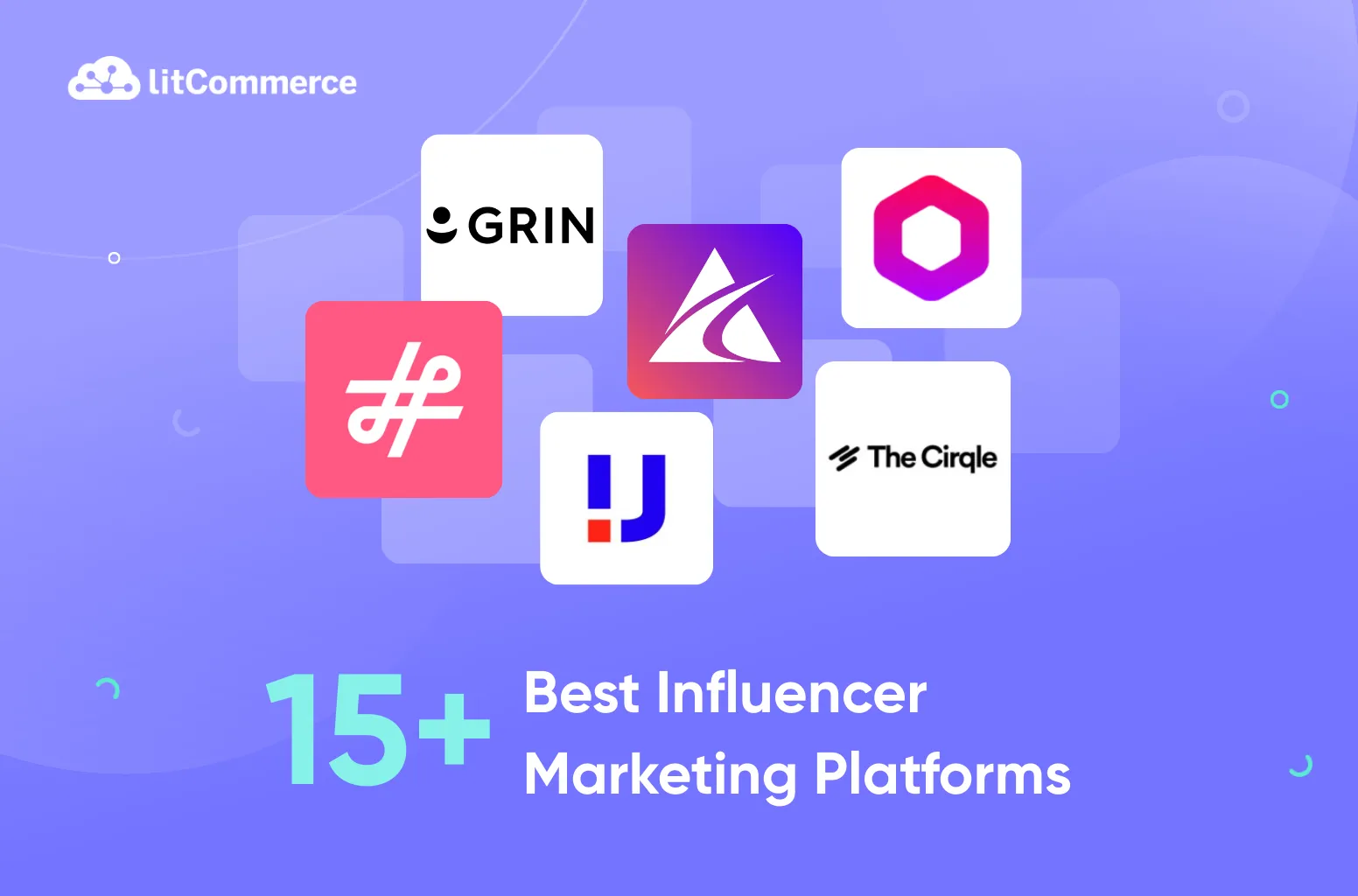The influencer marketing industry is projected to exceed $24 billion globally by 2025, as more brands shift their budgets toward creator-led campaigns. To keep up, businesses are turning to influencer marketing platforms, specialized tools designed to help brands discover, connect with, and manage influencers efficiently.
To help you get a handle on this quickly changing scene, we’ve dug deep and checked out 15 of the best influencer marketing platforms. We looked at their features, pricing, integrations, use cases, and real-world performance.
In this guide, you’ll discover which platforms are best for your specific needs. Let’s dive into the top picks.
Best Influencer Marketing Platforms in 2026
Here are 15 top influencer marketing platforms for you to try out:
Platform | Influencer discovery | Pricing | AI features | eCommerce focus | Notable integrations | Best for |
Upfluence | 12 million influencers | Custom pricing (enterprise tiered) | Smart search & data enrichment | Strong Shopify integration | Shopify, WooCommerce, Klaviyo | D2C brands, agencies |
Influencity | 200M+ profiles, deep audience filters | From ~$348–398/mo | Some AI in search & insights | Some support | GA, HubSpot, Excel exports | Large brands, data-centric teams |
The Cirqle | Strong focus on creators with audience fit | Tiered SaaS pricing | Predictive ROI, targeting | D2C sales campaigns | Shopify, GA, Meta Ads | ROI-obsessed brands |
Afluencer | Manual discovery + marketplace matching | Free plan + $49/mo+ | Minimal AI | Limited | Shopify | Small brands, solopreneurs |
GRIN | Verified creators; strong niche matching | Enterprise only (custom) | Workflow triggers, enrichment | Deeply embedded | Shopify, Klaviyo, GA | Enterprise eCom brands |
Favikon | Social score rankings, niche & credibility | From $69/mo | AI influencer scoring | No direct support | No major e-com tools | Solo marketers, analyst use |
Aspire | Powerful filters + invite-only creators | Custom pricing | Influencer suggestions | Designed for Shopify brands | Shopify, Gorgias, Klaviyo | Mid-size D2C brands |
Hypefy | TikTok-focused discovery + brand safety | Pay per campaign | AI scoring, fake follower detection | Video-focused sellers | TikTok Spark Ads, GA | Gen Z brands, TikTok first |
Qoruz | Indian market focus, deep audience insights | Custom/enterprise plans | Predictive influencer matching | Limited integrations | CRM, exportable reports | India-based campaigns |
CreatorHunter | Fast, minimal search UI; TikTok + IG | Free tier + pay-per-campaign | Minimal AI | No specific support | Basic tracking links | Creators for hire, small teams |
ImpulzeAI | 280M+ creators, AI lookalikes, smart filters | Free to $549/mo | AI assistant, predictive ROI | Strong Shopify integration | Shopify, GA, Facebook Pixel | Scalable ROI-focused D2C brands |
Shout | Invite-only; vetted creators | Flat rate pricing | No AI tools yet | Some UGC tracking | Basic GA/Facebook Pixel | Product gifting, niche campaigns |
GoMarketish | Basic filters; nano & micro creators focus | Free + $29–$119/mo | Basic automation | D2C gifting workflow | Shopify, Stripe | UGC seeding, early-stage brands |
Brandwatch Influence | Enterprise-level discovery, sentiment | Custom pricing (large brands) | AI-driven sentiment & targeting | Not focused on eCom | Brandwatch suite, social APIs | Global brand campaigns |
Sprout Social Influence | Built-in to Sprout Social platform | Add-on to Sprout Social plans | No influencer-specific AI | Social-centric only | Social analytics, CRM | Social-first brands/agencies |
1. Upfluence
Upfluence is an all-in-one influencer marketing and affiliate platform trusted by eCommerce and DTC brands. Known for its deep Shopify integration and global influencer database, it helps brands manage influencer relationships, track ROI, and scale campaigns across platforms like Instagram, TikTok, YouTube, and LinkedIn.
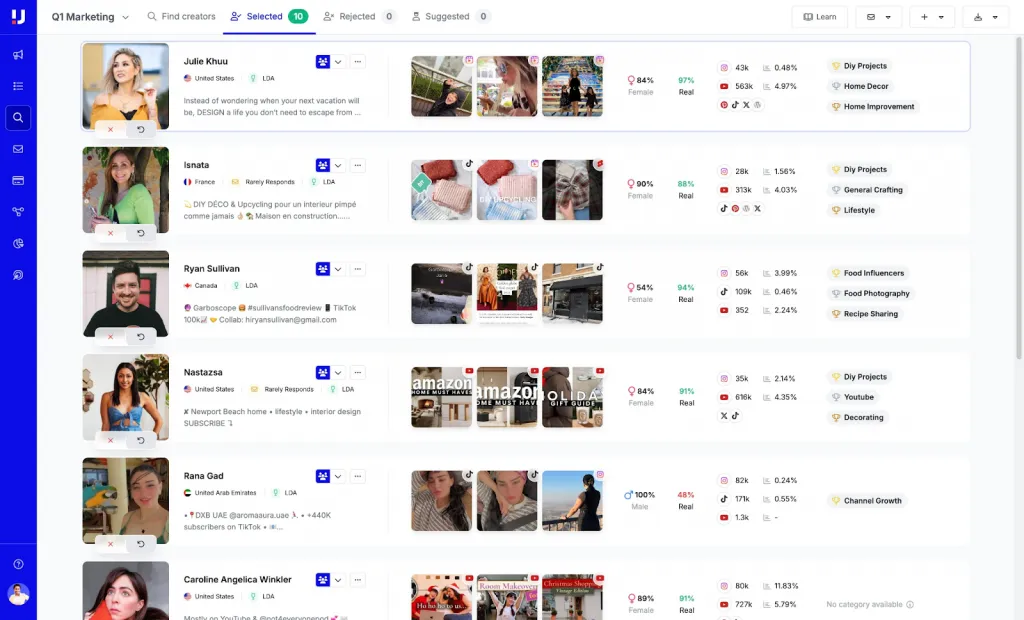
Notable features:
- Access 12M+ verified influencers with filters by niche, location, engagement, and more. AI suggests ideal matches and pricing.
- Automate workflows with drip emails via Gmail/Outlook or Upfluence. AI optimizes content, timing, and translations.
- Track influencer relationships, past campaigns, and communications with a built-in CRM.
- Connect Shopify, WooCommerce, Amazon, and more. Auto-generate coupons and track influencer-driven sales.
- Creators submit drafts for review. Approve content, enforce hashtags, CTAs, and FTC rules before publishing.
- Use AI to uncover hidden talent, improve outreach, and automate follow-ups.
Influencer type:
- Works with nano to macro-influencers, across both B2C and B2B niches.
- Strong coverage for fashion, beauty, food, SaaS, and LinkedIn influencers.
- Global support with filters for location, language, and audience demographics.
Pricing:
Upfluence offers three main plans tailored to business needs:
- Search & Contact: Focuses on creator discovery, outreach, and CRM tools.
- Campaign Manager: Adds automation, product shipping, affiliate tools, and performance tracking.
- Payments: Manages global payouts, affiliate commissions, and integrates with Stripe.
Pricing is custom based on features and team size. There’s no free trial, but demos are available on request.
Best for: Upfluence is ideal for mid-size to large eCommerce and DTC brands, especially those on Shopify, Amazon, WooCommerce, etc. Also, fashion, beauty, and agency teams will benefit from its modular pricing and strong ROI reporting.
2. Influencity
Influencity is one of the best influencer marketing platforms designed for brands and agencies managing large-scale or multi-market campaigns. Known for its massive influencer database and robust analytics, it helps marketing teams go beyond surface-level metrics to make informed, ROI-focused decisions.
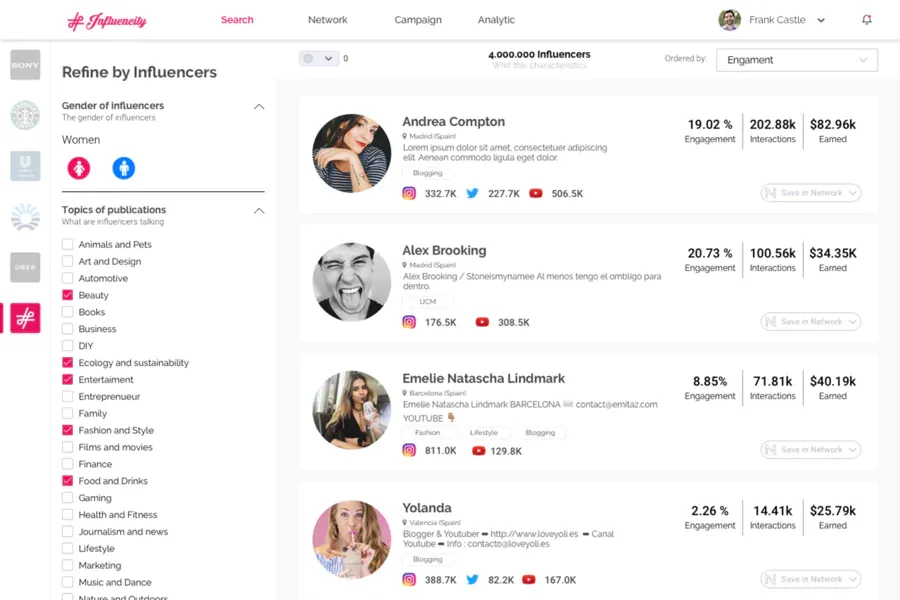
Notable features:
- Search 200M+ profiles using 20+ filters like demographics, keywords, engagement, and location to find top-fit creators.
- Assign tasks, set timelines, and manage multiple influencers from a single dashboard.
- Build segmented lists, track collaboration stages, and manage contacts with tags, notes, and ratings.
- Connect Shopify, Google Analytics, and tools like HubSpot via API/webhooks. Track sales and create discount codes.
- Get lookalike influencer suggestions, audience authenticity scores, and smart workflow automation using AI filters and triggers.
Influencer type:
Influencity supports influencers of all sizes, from nano to celebrity-level creators, across platforms like Instagram, TikTok, YouTube, and more.
Its global database makes it suitable for both localized targeting and multi-region campaigns, especially across Europe, LATAM, and Asia. While not hyper-specialized by niche, it’s highly effective for mainstream sectors like fashion, beauty, tech, and consumer goods.
Pricing:
Influencity offers modular, tiered pricing based on usage level:
- Professional (~$348–398/month): Perfect for businesses that carry out end-to-end influencer marketing campaigns throughout the year.
- Business plan: Full access to influencer search, outreach, and campaign tracking for brands running regular campaigns.
- Enterprise plan: Higher tiers allow multiple users, concurrent campaigns, advanced sharing, and tailored workflows.
Best for: Influencity is best for data-driven brands and agencies that need to manage influencer campaigns at scale and marketers who want to vet influencer authenticity, compare audience data, and track performance across multiple campaigns, especially in industries like fashion, beauty, tech, and gaming.
3. The Cirqle
The Cirqle is a performance-first influencer marketing platform designed to drive measurable ROI. As a verified Facebook and TikTok Marketing Partner, it combines curated influencer discovery with deep analytics, campaign automation, and predictive ROAS scoring. It’s a go-to solution for brands that treat influencer marketing like paid media, tracking every click, conversion, and dollar.
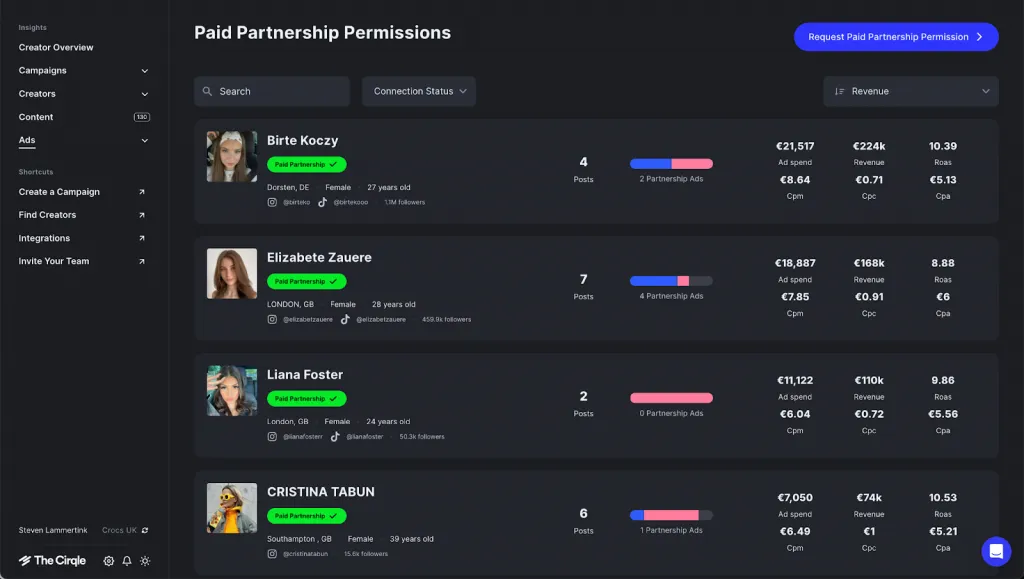
Notable features:
- Access 1M+ API-verified creators across Instagram, TikTok, and YouTube from a highly vetted network.
- AI manages influencer selection, contracts, product seeding, scheduling, and rate negotiation — end to end.
- Store all content with usage rights included. Easily whitelist posts for paid ads like TikTok Spark Ads.
- Connect with Shopify, Facebook Ads, TikTok Ads, and Google Analytics. Sync data via API to CRMs/BI tools.
- Set safety rules, ensure FTC compliance, automate contracts, and manage influencer payments and taxes securely.
- AI allocates budget, learns from performance, and improves future influencer targeting and results.
Influencer type:
The Cirqle works best with mid-tier to micro-influencers who generate high engagement and sales.
Geographically, it focuses on North America and Europe, with some support in LATAM and other regions. Influencers are active primarily on Instagram, TikTok, and YouTube.
Pricing:
- Launch (€1,000/month): 2 campaigns, basic analytics
- Grow (€2,000/month): Adds ROAS scoring, AI briefs, more users
- Scale (€4,000/month): Predictive analytics, 24/7 support, unlimited platforms
- Enterprise (custom): API access, custom integrations, branding, and strategy support
Additional fees may apply, such as commission on influencer payments. Most plans require annual contracts, so The Cirqle is best suited for brands with ongoing or multi-campaign strategies.
Best for: The Cirqle is best for mid-to-large DTC brands and performance marketers, especially eCommerce, consumer apps, and retail brands looking to scale micro-influencer campaigns.
You may also like: How & Where to Sell Antiques Online: 10 Best Places in 2026
4. Afluencer
Afluencer is a beginner-friendly influencer marketplace built for small businesses and startups. Often called “the best free influencer marketing platform,” it offers a curated pool of creators and a Collab-based workflow that flips the script: influencers apply to your campaigns, not the other way around.
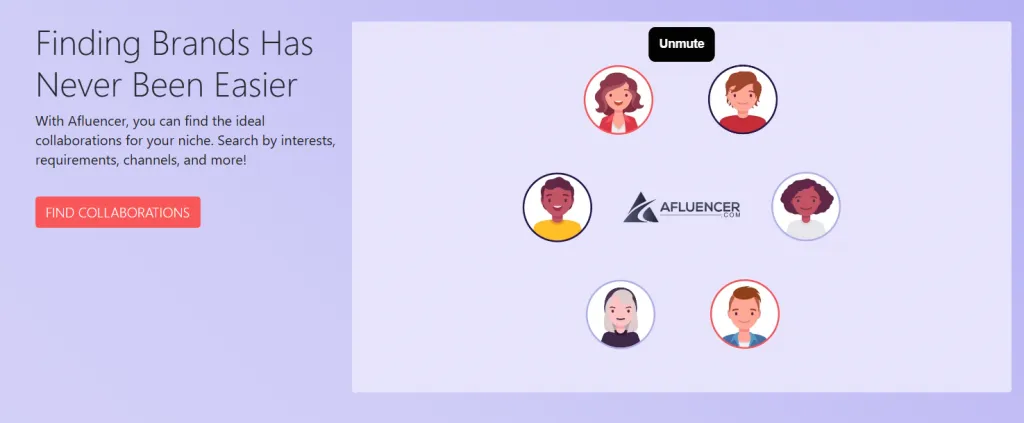
Notable features:
- Access 42K+ verified creators across Instagram, TikTok, YouTube, and more.
- Post a campaign listing and let influencers apply — no manual outreach needed.
- Manage briefs, shipping info, deadlines, and comms via in-app chat and email.
- Save top creators, maintain chats, and reuse partnerships. Both sides can leave reviews post-collab.
- Share discount codes, track links, and collect shipping details for seeding and affiliate campaigns.
Influencer type:
Afluencer focuses on nano and micro-influencers, especially in lifestyle, fashion, beauty, wellness, fitness, food, and similar DTC-friendly niches. Most creators are based in North America, though there is international coverage.
Pricing:
Afluencer’s free plan lets brands post Collabs and connect with a limited number of influencers
Paid plans are affordable and flexible, starting at $49/month and scaling to around $199/month.
Best for: Afluencer is one of the best influencer marketing platforms for small businesses, startups, and solo entrepreneurs with limited budgets, offering a simple, no-friction platform for gifting products or basic affiliate partnerships. It’s ideal for indie DTC brands (beauty, wellness, fashion, food) and local businesses seeking creators without complex enterprise tools.
5. GRIN
GRIN is widely regarded as the best influencer marketing software for medium to large eCommerce and DTC brands. Unlike influencer marketplaces, GRIN allows brands to build private influencer programs from the ground up, managing recruitment, outreach, content, payments, and ROI tracking all in one centralized system.
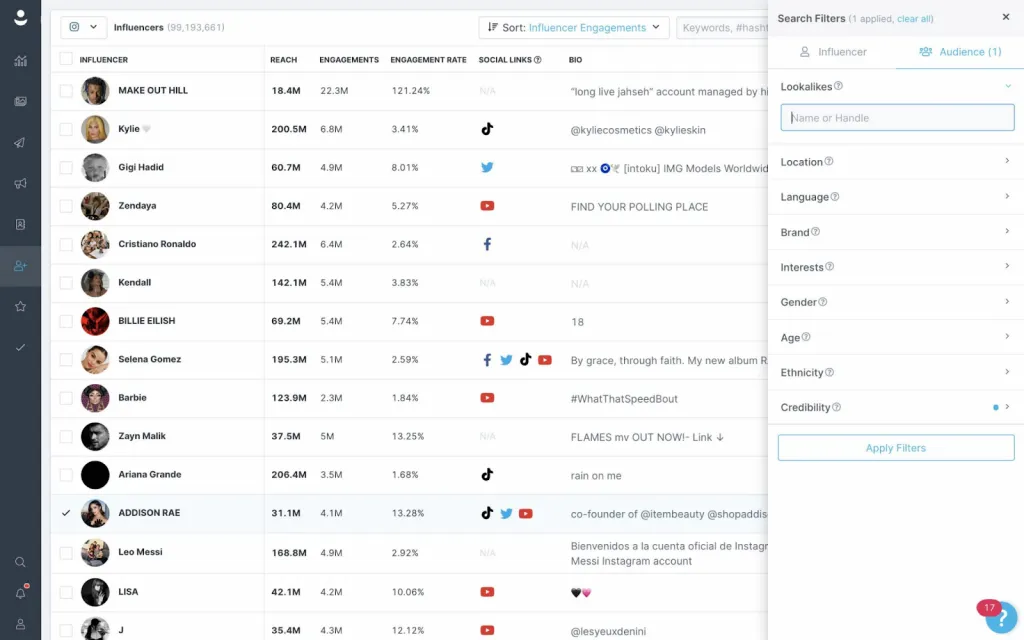
Notable features:
- Search 100M+ creators with deep filters or import customer/follower lists to match with influencers.
- Track clicks, sales, ROI, and earned media via direct Shopify, WooCommerce, and affiliate platform integrations.
- Each influencer has a profile with history, notes, and performance. Manage outreach, ambassador programs, and long-term relationships.
- Create discount codes and links, automate product seeding from Shopify, and track fulfillment.
- Store campaign content, track approvals, manage rights, and license creator assets for ads.
Influencer type:
GRIN supports influencers across all tiers, from nano to celebrity creators, across Instagram, TikTok, YouTube, Twitch, and blogs. Its strength lies in managing large ambassador programs and high-volume micro-influencer outreach.
Pricing:
GRIN operates on an annual license model, with pricing typically between $25,000 to $40,000 per year. There’s no self-serve plan or free trial, onboarding is done via sales calls and custom quotes based on features and user seats.
Best for: GRIN is best for established eCommerce brands doing $5M+ in annual revenue. When you want to scale from 10 to 100+ influencers, run product seeding + affiliate + paid collabs simultaneously, and treat influencer marketing as a long-term acquisition channel.
6. Favikon
Favikon is an AI-powered top influencer marketing platform designed for brands that prioritize data and quality over scale. Unlike full-suite influencer platforms, Favikon focuses on finding and vetting creators, especially within B2B, LinkedIn, and niche categories, using AI scoring, deep profile insights, and curated creator lists.
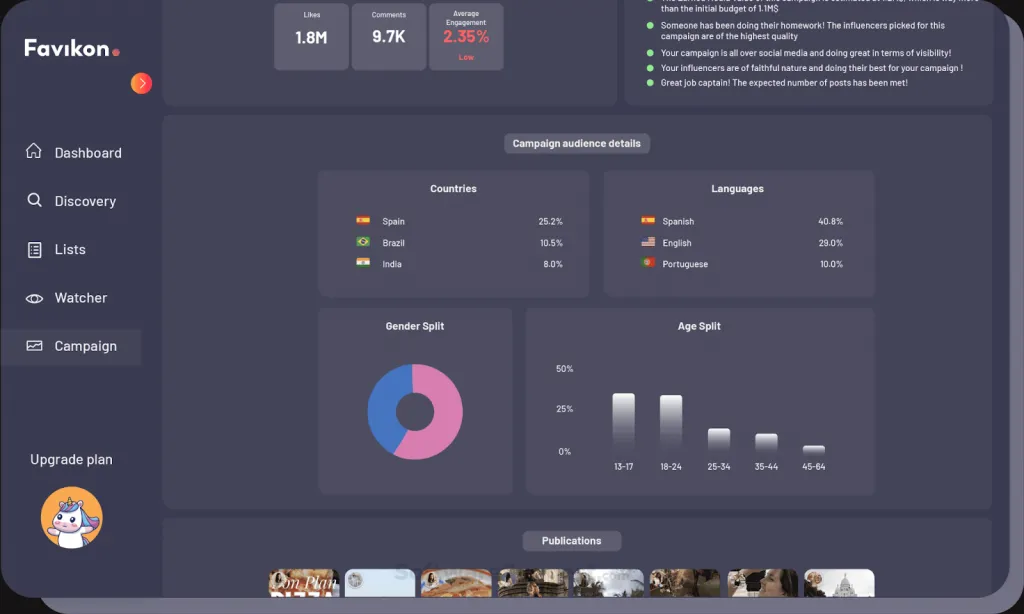
Notable features:
- Favikon ranks creators using proprietary AI scores across 750+ categories based on niche, quality, and trust.
- Search 10M+ influencers on Instagram, TikTok, YouTube, X, and LinkedIn with precise filters.
- Save, tag, and track profiles in a lightweight CRM for organized vetting and basic campaign tracking.
- Strong LinkedIn data makes it ideal for B2B, SaaS, and professional influencer marketing.
- View AI-generated summaries, bios, and rankings to quickly assess creator value.
- Analyze influencer metrics in real time while browsing social platforms.
Influencer type:
Favikon covers a broad global influencer base, but stands out for its ability to surface:
- B2B and professional influencers, especially on LinkedIn
- Micro- and niche influencers in fields like AI, health, SaaS, finance, or sustainability
- Authentic creators with verified, active audiences
- Instagram, YouTube, TikTok, and X creators, as well as podcasters and bloggers
Pricing:
- Starter ($69/month): More CRM slots and expanded search.
- Standard ($139/month): Creator analysis and partnership management.
- Pro ($299/month): Deeper analytics and more extensive search.
Best for: Favikon is best for data-first brands and agencies, B2B/SaaS companies needing LinkedIn/niche experts, and startups/growing businesses seeking affordable influencer discovery and research. It’s ideal for teams wanting AI-driven insights without a costly full-suite platform.
7. Aspire
Aspire, with a deep focus on workflow automation, e-commerce integration, and ROI tracking, is another best platform for influencer marketing. Its smart tools, from AI-powered image search to product seeding logistics, make Aspire a favorite among mid-to-enterprise-level marketing teams.
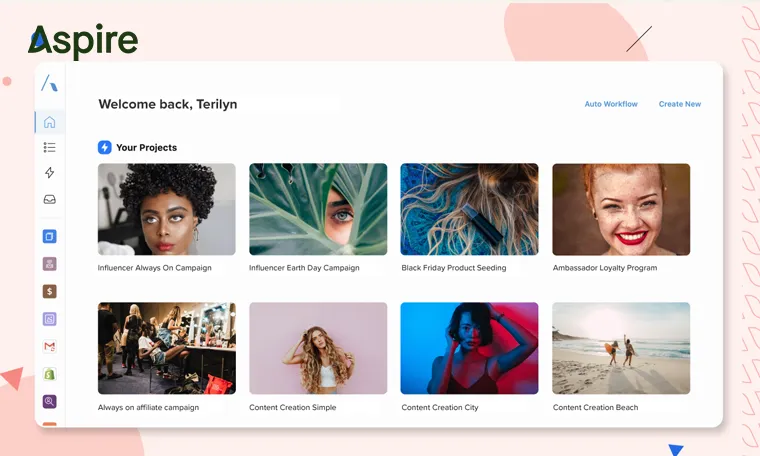
Notable features:
- Find creators via manual search, AI suggestions, QuickMatch, social listening, and image-based search across major platforms.
- Manage everything from outreach and briefs to contracts, shipping, payments, and performance reports.
- Build ambassador programs, assign codes/links, automate seeding, and handle commission payouts.
- Connect Shopify, Google Analytics, email tools, and Zapier for sales tracking and automated order creation.
- AI powers influencer matching, media value estimates, and workflow triggers to streamline large-scale campaigns.
Influencer types:
- Instagram and TikTok influencers popular with DTC and lifestyle brands
- YouTube content creators, especially useful for reviews, tutorials, and long-form storytelling
- Affiliate marketers and bloggers, ideal for ongoing ambassador or referral programs
- Customer-turned-creators, identified via Shopify or social mentions, enabling brands to recruit real users as influencers
- Niche community builders in industries like wellness, beauty, food, fashion, tech, gaming, and more
Aspire is platform-agnostic and globally focused, with a strong base in North America and Europe, but also tools to run multilingual, multi-country campaigns.
Pricing:
Aspire follows a custom pricing model based on your plan tier (Basic, Pro, Enterprise), team size, and campaign volume.
Best for: Aspire suits mid-to-large eCommerce brands, DTC companies, agencies, and in-house teams who desire comprehensive control over influencer campaigns, including discovery, contracts, payments, and tracking.
8. Hypefy
Hypefy is a fully AI-driven best influencer marketing platforms that automates every step of micro-influencer campaigns. Brands simply input their campaign goal, audience, and budget, and Hypefy’s system handles influencer matching, outreach, negotiation, content briefing, compliance, and ROI tracking.
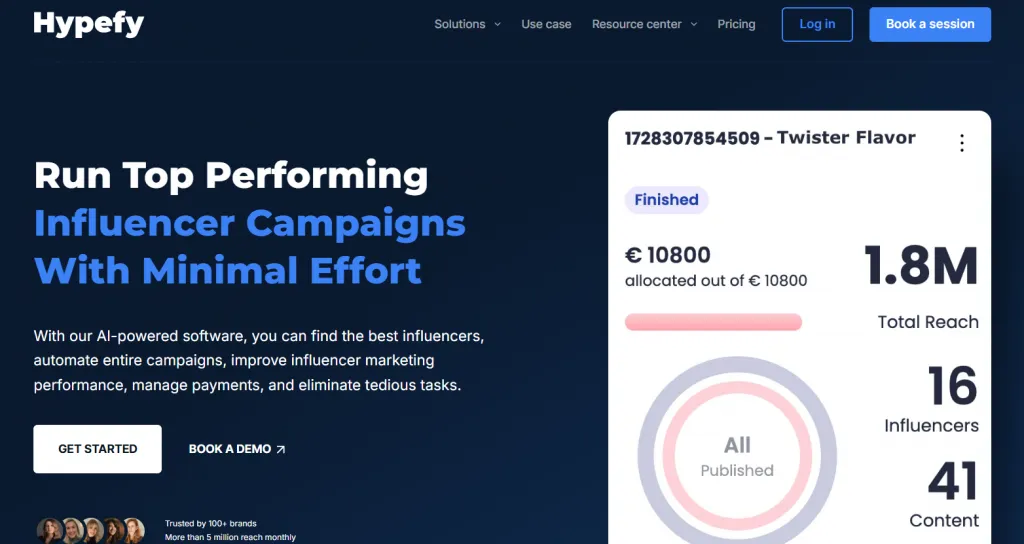
Notable features:
- No manual search, AI picks the best-fit micro-influencers on Instagram and TikTok based on your campaign needs.
- Get custom content briefs and mood boards auto-generated to align creators with your brand vision.
- Influencers are contacted and negotiated with automatically. AI suggests fair rates based on data.
- Hypefy manages everything: content, contracts, payments, and follow-ups.
- Learn which influencers perform best and improves future campaigns with smarter selection.
Influencer type:
- Micro- and nano-influencers (generally under 50K followers)
- Instagram & TikTok creators across global markets
- Consumer-focused verticals like beauty, fitness, food, fashion, tech
- Local creators for region-specific targeting
- High-performing creators selected for brand-fit, not just popularity
Pricing:
Hypefy uses a “One-Time License” model, suitable for both startups and enterprises. Pay per campaign with transparent, campaign-based pricing. Easily launch pilot campaigns with no commitment.
Best for: Hypefy excels for performance-driven brands, busy marketing teams seeking automation, companies scaling micro-influencer campaigns, global brands with localized outreach.
9. Qoruz
Qoruz is a data-driven influencer marketing platform offering enterprise-grade features for discovery, campaign execution, analytics, and relationship management. With a global influencer database and powerful AI-powered insights, it enables large-scale, performance-focused influencer programs, especially strong in India and APAC markets.
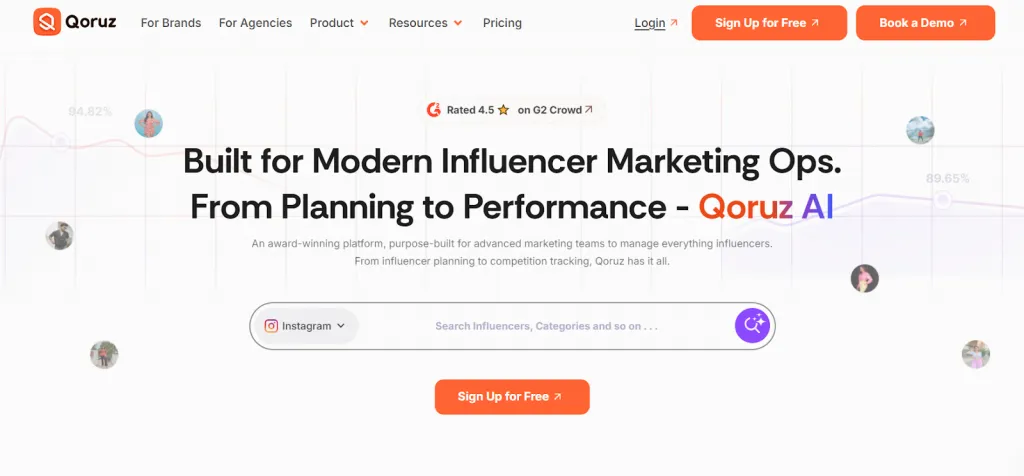
Notable features:
- Search 7.5M+ global creators (500K+ in India) across major platforms using 100+ niches and 20+ filters.
- Track past collabs, manage influencer lists, and store conversations. Use the Qoruz Score to rank creator value.
- Integrate product catalogs, monitor influencer-driven sales, and gain insights from partners like Flipkart.
- Qoruz AI delivers smart recommendations, trend spotting, lookalike creators, and campaign planning suggestions.
Influencer type:
- Macro to micro-influencers across Instagram, YouTube, X, Facebook, and blogs
- Indian creators at scale, along with global coverage
- Consumer and lifestyle creators across 100+ niches (fashion, tech, beauty, food, etc.)
- Emerging market influencers in regional languages and geographies
- Authentic, data-vetted creators selected based on audience credibility and impact
Pricing:
Pricing options include free sign-up with limited features, enterprise pricing for advanced tools, and custom plans based on usage, features, or campaign size.
Best for: Qoruz is one of the best influencer marketing platforms that excels for large brands, agencies, and enterprise teams in India & APAC, needing deep influencer analytics, end-to-end campaign management.
10. CreatorHunter
CreatorHunter is a curated influencer discovery and outreach platform tailored specifically for software startups, app creators, and tech brands. With a focus on high-quality micro-creators in tech and productivity niches, it simplifies influencer marketing through human-vetted databases and AI-powered outreach automation.
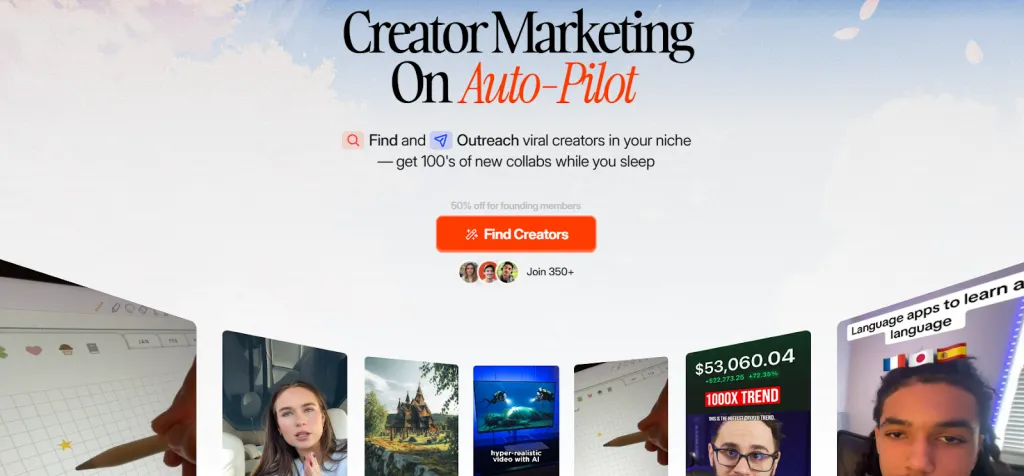
Notable features:
- Access 3K–13K vetted creators on Instagram, TikTok, and YouTube, focused on tech, apps, and productivity.
- Automate personalized pitches and follow-ups — AI handles outreach until creators reply.
- Track status, organize creator lists, and manage communication history with ease.
- Browse each creator’s top-performing content in a built-in “UGC showroom” for quick quality checks.
Influencer type:
- Micro-influencers (often <100K followers)
- Tech-focused creators (software, apps, SaaS, AI, productivity, marketing, fitness tech)
- YouTubers, TikTokers, and Instagram creators
- English-speaking creators in global tech markets (US, UK, EU)
- Reviewers and niche app influencers
Pricing:
- $97/month (subscription) with full feature access
Best for: CreatorHunter is ideal for startup founders, indie app developers, and tech companies needing fast, curated influencer access for SaaS tools, mobile apps, or AI products.
11. ImpulzeAI
ImpulzeAI is a powerful, AI-driven influencer marketing platform designed for eCommerce and D2C brands. It combines a massive global influencer database, detailed audience analytics, automated outreach, and ROI-focused campaign tracking, all within an affordable SaaS package.
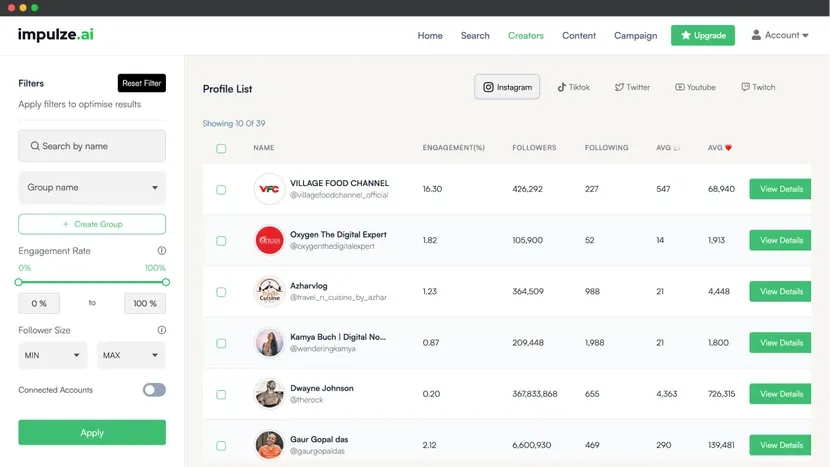
Notable features:
- Access 280M+ influencer profiles across Instagram, TikTok, and YouTube with 30+ filters to find perfect-fit creators.
- Monitor clicks, sales, engagement, and conversions in real time. Share white-label reports with Shopify/GA integration.
- Manage outreach, deliverables, UGC, and reminders with an all-in-one CRM and workflow tracker.
- Connect with Shopify, GA, Facebook Pixel, and tools like HubSpot via Zapier/API. Track purchases by influencer.
- Use AI for lookalike discovery, outreach, data enrichment, and budget recommendations based on performance history.
Influencer type:
- Nano, micro, and macro influencers across Instagram, TikTok, and YouTube
- High-converting eCommerce influencers
- Global creators across every niche (fashion, tech, fitness, food, skincare, crypto, etc.)
- Creators with strong audience-match to your buyer profile
Pricing:
- Free plan: $0/month (basic discovery and 1 campaign)
- Starter plan: $89/month (adds CRM, analytics, contact info, basic campaign tools)
- Professional plan: $199/month (adds UGC tracking, white-label reports, outreach automation)
- Advanced plan: $549/month (for agencies managing 100s of campaigns)
Best for: ImpulzeAI is one of the best influencer marketing platforms ideal for D2C/e-commerce brands focused on measurable sales, agencies managing multiple campaigns.
You may also like: Where To Sell Electronics for Maximum Returns in 2026
12. Shout (GetShout.io)
Shout positions itself as “The Influencer Search Engine”, a lean, efficient platform for brands that want to quickly find and contact influencers without paying for bloated features they may not need. It’s particularly strong in hyper-local targeting, cost-efficiency, and fast outreach, making it a favorite among startups, small businesses, and local marketers looking for Instagram or YouTube creators.
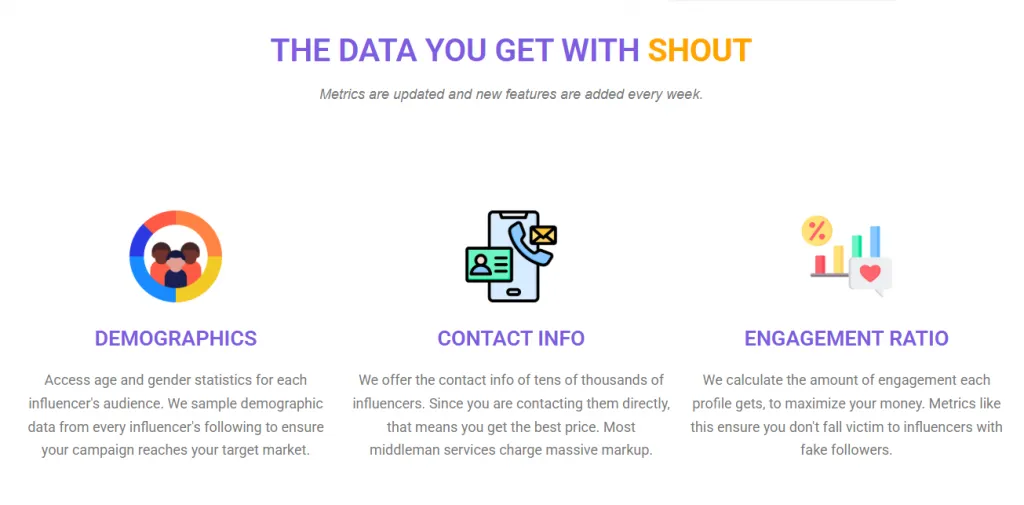
Notable features:
- Uses AI to tag post content by niche (fitness, travel, etc.) for highly accurate influencer discovery across Instagram and YouTube.
- Send personalized emails at scale using templates, automation, and custom fields via SendGrid.
- View engagement rates, audience demographics, CPM, and follower stats for each profile.
- Create influencer groups and export data for easy sharing and offline use.
- Pull influencer data into your own tools or CRM for advanced, custom workflows.
Influencer type:
- Micro to mid-tier influencers on Instagram and YouTube
- Local influencers who are active in a specific city or region
- Niche content creators in lifestyle, fashion, beauty, food, travel, and wellness
- Influencers with verified contact info for direct outreach
Pricing:
- Free browsing of the influencer database
- Larger bundles available:
- Silver: ~$97 for 150 contacts
- Gold: ~$297 for 1,500 contacts
- Platinum: ~$997 for 8,000 contacts + API access
Best for: Shout is ideal for budget-conscious small/local businesses and startups needing quick influencer connections. It’s also suitable for agencies managing manual outreach and B2C Instagram/YouTube campaigns focusing on awareness or niche content.
13. GoMarketish
GoMarketish is a rising, AI-powered influencer marketing platform designed for scalable yet accessible campaign execution. With a massive creator database and emphasis on automation, affordability, and ROI, it’s ideal for lean marketing teams and growth-stage brands looking to streamline influencer discovery, outreach, and tracking.
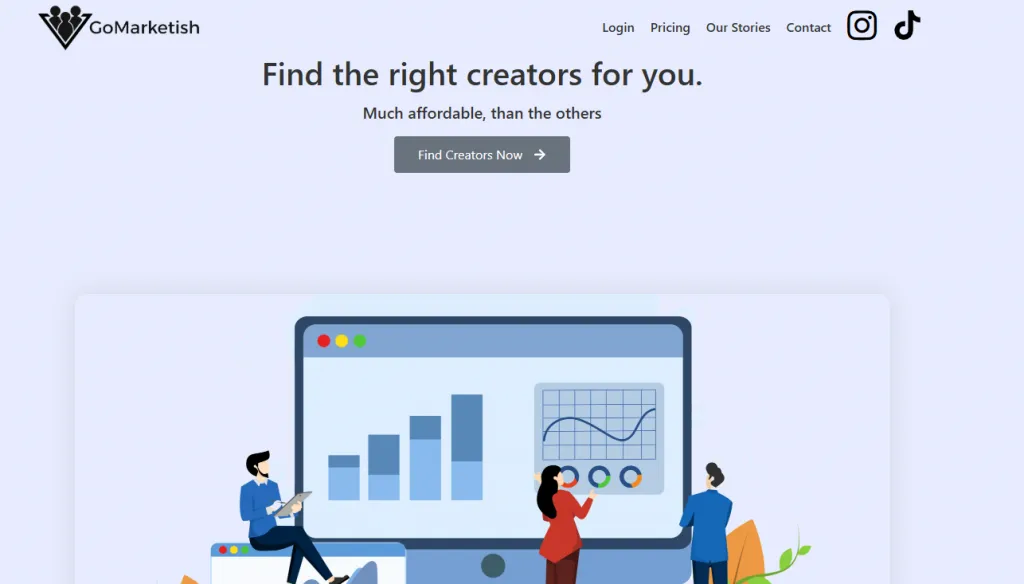
Notable features:
- Search 10M+ influencers using filters or AI-powered “Magic Search” that matches creators to your campaign brief.
- Send personalized influencer messages at scale using built-in outreach tools.
- Group influencers (e.g., “VIPs,” “Ambassadors”), track communication, and review past campaign results.
- Use API access for custom dashboards, BI tools, or CRMs. Export data or connect via email integrations.
Influencer type:
- Micro to mid-tier creators on platforms like Instagram, TikTok, YouTube
- Niche influencers across lifestyle, wellness, fashion, beauty, tech, etc.
- Regionally targeted influencers for hyper-local or global campaigns
- Customer advocates or ambassadors, especially if tied to email lists or prior buyers
Pricing:
- Trial plan ($0/month): limited number of creators and basic analytics access
- Starter plan ($29/month): 4.8M+ influencer profiles access
- Expert plan ($119/month): 9.9M+ global influencers access
Best for: GoMarketish is best suited for growth-focused startups and lean in-house marketing teams that need an efficient, scalable way to manage influencer campaigns without enterprise-level complexity.
14. Brandwatch Influence
Formerly known as Paladin, Brandwatch Influence is a premium, enterprise-grade best influencer marketing platforms designed to support complex, multi-market campaigns. Backed by Brandwatch’s powerful social intelligence engine, it provides deep data discovery, campaign automation, customizable analytics, and more.
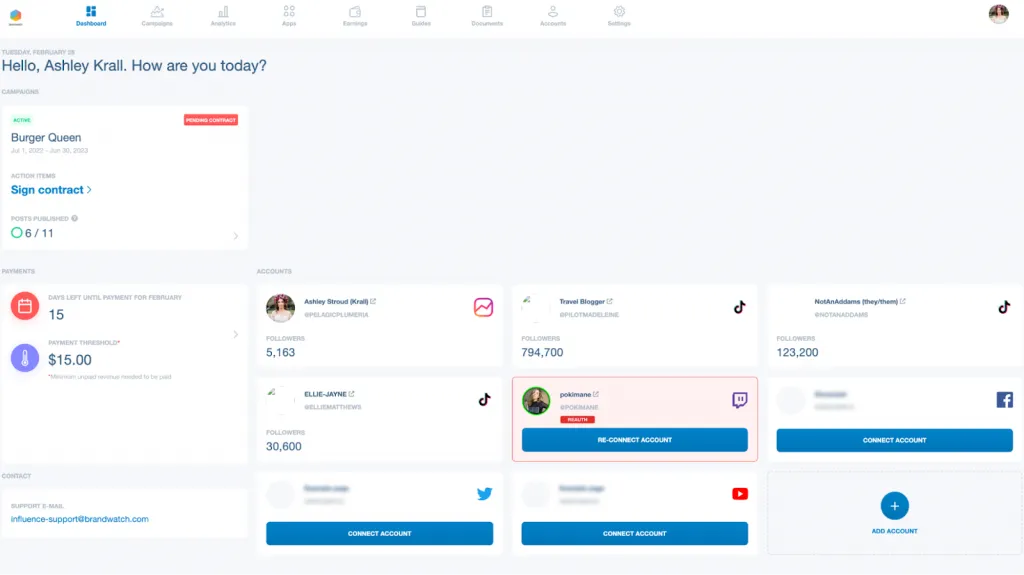
Notable features;
- Access to a curated database of 24M+ creators across Instagram, YouTube, TikTok, Twitter/X, and more.
- Track ROI, brand lift, and share of voice with social listening and white-labeled performance reports.
- Connect with Tipalti, CRMs, Slack, Asana, and more. Attribute sales using Brandwatch’s full tech stack.
- Store usage rights, approve content, and request whitelisting for paid ad campaigns.
- Automate onboarding, payouts, and reporting. AI suggests best-fit creators and predicts campaign success.
Influencer type:
- Nano, micro, macro, and celebrity influencers across all major platforms
- B2C and B2B influencers, from lifestyle creators to niche experts
- Creators across 13+ languages and global regions
- Both brand-managed influencers and organic social talent surfaced via listening
Pricing:
- Custom enterprise pricing: Starts around $750/month and scales with user count, modules, and use case complexity
- Annual contract required, typically $1,000–$5,000+/month for most teams
Best for: Brandwatch Influence suits enterprise brands, agencies, and marketing teams for comprehensive influencer management, advanced compliance, and martech integration.
15. Sprout Social Influence Marketing
The last name on the best influencer marketing platforms list is Sprout Social. Formerly known as Tagger, Sprout Social’s influencer platform is an AI-powered, enterprise-grade solution for full-funnel influencer marketing. It combines advanced discovery, deep analytics, content collaboration, and eCommerce integrations.
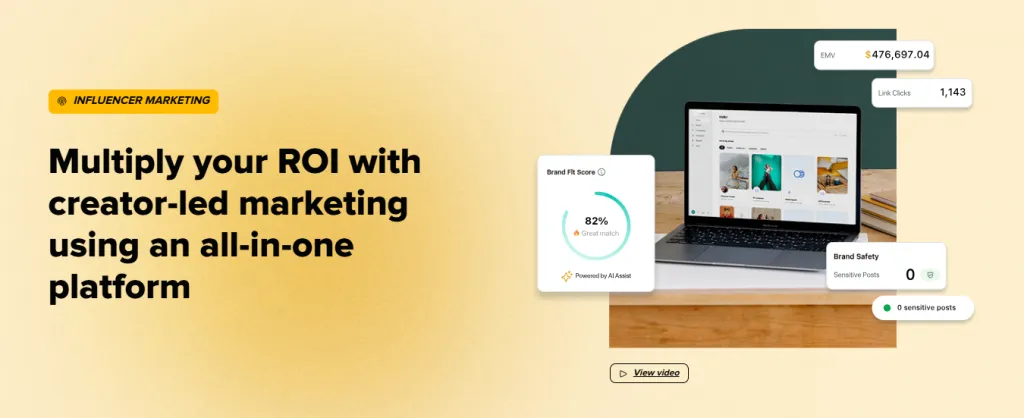
Notable features:
- Find influencers based on audience interests, not just categories. AI Brand Fit Score shows alignment with your brand.
- Connect Shopify, GA, TikTok/Facebook Ads, and sync data to CRMs/BI tools via API or Zapier.
- Approve content before it goes live. Use Partnership Ads to boost posts and track ROI directly.
- Automate discovery, outreach, approvals, and reporting. AI also scores fit, vets content, and optimizes workflows.
Influencer type:
- Nano, micro, macro, and celebrity creators
- B2C and B2B influencers
- Creators across 150+ countries and all major platforms
- Ideal for brands seeking authentic, brand-aligned creators
Pricing:
- Enterprise pricing: Starts at ~$1,600/month with ~$600 per additional user
- Annual contract required; no free trial for influencer module
Best for: Sprout Social Influence is ideal for enterprise brands and agencies managing multi-region/multi-campaign influencer programs. It’s also suitable for organizations scaling influencer efforts across departments, brands, or clients while ensuring brand safety and compliance.
How to Choose the Right Influencer Platform for Your Business?
Picking the right influencer marketing platforms can help each stage of your marketing funnel run more smoothly, boosting both efficiency and ROI. Here’s how to narrow it down:
- Define your campaign goals: Are you focused on brand awareness, UGC, or sales conversion? Some platforms specialize in discovery and content creation, while others excel in attribution and ROI tracking. Match the platform’s strength to your goals.
- Know your budget: Influencer tools range from free or $49/month to $1,500+ per month. If you’re a startup, go for tools like Afluencer or ImpulzeAI. Larger brands may justify enterprise-grade tools like GRIN, Aspire, or Sprout Social.
- Prioritize key features: Do you need AI-powered search, Shopify integration, affiliate management, or content licensing? List must-have features like CRM, contracting, gifting, or performance tracking, then filter platforms accordingly.
- Consider your niche and geography: If you’re in fashion or beauty, many platforms will work. But for B2B, regional markets (like India), or tech influencers, choose platforms with specialized databases like Qoruz or CreatorHunter.
You may also like: Top Ecommerce Platforms: 8 Best Websites for Sellers
Final key takeaways to find the best influencer marketing platforms:
If you are... | Consider |
A startup or solo marketer | GoMarketish, Afluencer, CreatorHunter |
A fast-growing DTC brand | ImpulzeAI, Aspire, Upfluence |
A large agency or enterprise | GRIN, Sprout, Brandwatch |
Focused on TikTok/UGC | Hypefy, CreatorHunter, Aspire |
Looking for cost-effective scale | ImpulzeAI, Influencity |
Best Influencer Marketing Platforms – FAQs
1. What is the best influencer marketing platform for small business?
Platforms like Afluencer, CreatorHunter, and ImpulzeAI are affordable, easy to use, and offer great value for startups or small brands without huge budgets.
2. What is the best influencer marketing platform for ROI tracking and sales attribution?
If tying influencer efforts directly to revenue is a priority, consider Upfluence, ImpulzeAI, or Sprout Social; they offer robust analytics, conversion tracking, and ROI dashboards.
3. What’s the difference between an influencer marketplace and a CRM platform?
A marketplace (like Afluencer or Hypefy) matches you with creators to run fast campaigns. A CRM platform (like GRIN or Brandwatch) helps manage long-term influencer relationships, content rights, and campaign workflows at scale. Choose based on your goals.
Conclusion
Choosing the best influencer marketing platforms comes down to your brand’s size, goals, and marketing style. Whether you’re a startup looking for affordable outreach tools or an enterprise brand needing deep analytics and automation, there’s a solution out there tailored to your needs.
With the right tool, you’ll move from trial-and-error to long-term, profitable influencer partnerships.Now that you know what to look for, you’re one step closer to finding the best influencer marketing platform for your brand. Check out LitCommerce blog for more helpful guides for your businesses.

